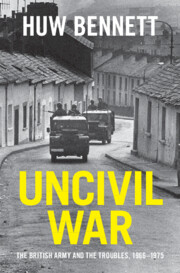Book contents
- Uncivil War
- Cambridge Military Histories
- Uncivil War
- Copyright page
- Dedication
- Contents
- Figures
- Maps
- Tables
- Illustrations
- Abbreviations
- Introduction
- 1 Baggage
- 2 The Army’s Short-Lived Ulster Honeymoon
- 3 Escalation and the Erosion of Impartiality
- 4 Edward Heath’s Bid for Victory
- 5 The Road to Bloody Sunday
- 6 The Most Deadly Year
- 7 Strategy in the Shadow of Loyalist Power
- 8 We Cannot Envisage Peace
- Conclusion
- A Note on Sources
- Acknowledgements
- Notes
- Bibliography
- Index
6 - The Most Deadly Year
Published online by Cambridge University Press: 03 August 2023
- Uncivil War
- Cambridge Military Histories
- Uncivil War
- Copyright page
- Dedication
- Contents
- Figures
- Maps
- Tables
- Illustrations
- Abbreviations
- Introduction
- 1 Baggage
- 2 The Army’s Short-Lived Ulster Honeymoon
- 3 Escalation and the Erosion of Impartiality
- 4 Edward Heath’s Bid for Victory
- 5 The Road to Bloody Sunday
- 6 The Most Deadly Year
- 7 Strategy in the Shadow of Loyalist Power
- 8 We Cannot Envisage Peace
- Conclusion
- A Note on Sources
- Acknowledgements
- Notes
- Bibliography
- Index
Summary
This chapter analyses British strategy once direct rule had been imposed from London, and covers the period up to September 1972, when talks between the political parties happened without the moderate nationalist Social Democratic and Labour Party. The chapter documents the efforts by the army to buttress Northern Ireland Secretary William Whitelaw’s quest for peace. Discontent lingered amongst elements in the security forces over restraint in fighting the IRA. Low-level brutality continued, particularly in tough regiments. In July the British government and the Provisionals held secret negotiations. Beforehand, republicans and loyalists targeted civilians to shape the impending dialogue. Senior figures in the Ministry of Defence believed loyalist attacks on Catholics might encourage republicans to modify their demands. Loyalist mobilisation probably convinced the government not to give anything away to republicans. These events, and the success of Operation Motorman in re-entering republican areas, persuaded the army to go back on the offensive against the Provisionals. In doing so they committed to retaining internment, expanding interrogation and adopting a modus vivendi with loyalists. These choices allowed the force level in Northern Ireland to be brought down, as demanded by the commitment to NATO, and swelling discord about repeated deployments on a deeply unpleasant mission.
Keywords
- Type
- Chapter
- Information
- Uncivil WarThe British Army and the Troubles, 1966–1975, pp. 163 - 203Publisher: Cambridge University PressPrint publication year: 2023

